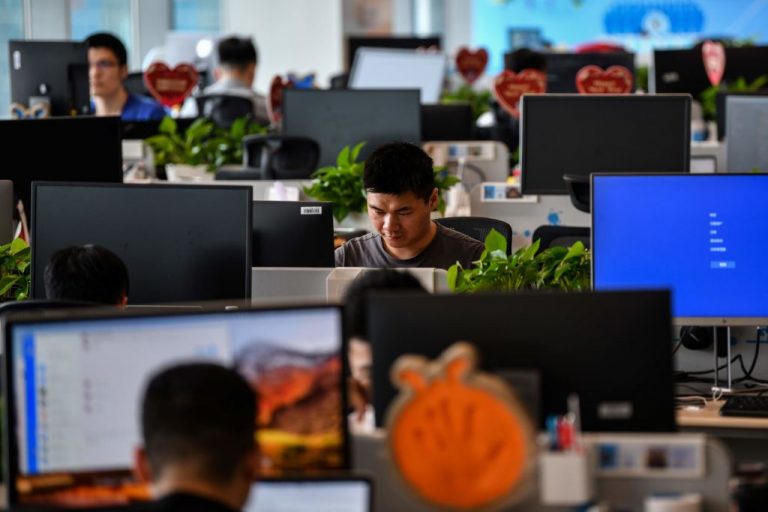On May 17, Chinese officials met with some of the country’s most prominent tech executives amid a year-long crackdown that has wiped billions of dollars from one of its most lucrative homegrown sectors.
Following the meeting, Beijing signaled an easing of restrictions, with China’s vice premier Liu He pledging support for the country’s battered tech sector and unveiling plans for internet companies to go public.
In the last few months, authorities in China have been battling a relentless resurgence of COVID-19, with at least 32 cities remaining under some degree of lockdown or movement restrictions. The prolonged lockdows have severely affected the world’s second largest economy as businesses and factories have been forced to remain shut for weeks on end, disrupting supply chains and cutting consumer spending.
MORE ON CHINA’S ECONOMY:
- Xi vs. Li? Analyzing Political Rumors About a ‘Split’ Between China’s President and Premier
- ‘Zero-COVID’ Lockdown in Shanghai Compounds Xi’s Political Dilemma
- Here’s Just How Badly ‘Zero-COVID’ Has Damaged China’s Economy
- COVID Lockdowns Cut 98% of Tesla’s April China Sales, Production Also Hard-Hit
Shanghai, in particular, being China’s largest metropolis and financial hub, has been held under the strictest lockdown measures the world has ever seen.
For over seven weeks now, the lockdowns have resulted in a growing number of residents posting videos on social media showing authorities in white hazmat suits violently beating residents found “breaking quarantine,” while others have reportedly even starved to death inside their homes after completely running out of food and essentials.
The tech meeting comes after Chinese leader Xi Jinping chaired a meeting in April calling on the Politburo, (the Chinese regime’s top decision making body) to “support the healthy development of the so-called platform economy, which includes internet companies in areas from social media to e-commerce.”
Success
You are now signed up for our newsletter
Success
Check your email to complete sign up
“The pandemic has to be contained, the economy should be stabilized, and the development should ensure security,” a statement released after the meeting said, highlighting the complex situation currently plaguing China’s economy as “changes unseen for a century.”
“We must insist on the policies of preventing both inbound infections and a domestic rebound of cases, and [adhere to] dynamic Zero-Covid, doing our best to protect people’s lives and minimize its impact on the national economy and society,” it said.
‘[Meeting] is not a U-turn on the tech crackdown’
Despite tech giants embracing the meeting as a sign of good news lying ahead, analysts were quick to point out that Beijing’s positive rhetoric should not be mistaken for a complete reversal in policy.
“I think the big tech companies will have a grace period for maybe the next six months,” Linghao Bao, a tech analyst at Trivium China, told CNBC on May 17.
“However, this is really not a U-turn on the tech crackdown, the long-term outlook hasn’t changed yet. Because Beijing has already come to the conclusion that it is a bad idea to let big tech companies run wild and create unfair market competition … wealth will be concentrated at the top and it will start to influence politics,” Bao said.
“So the tech crackdown is really here to stay over the long term.”
Enhanced regulations continue for now
Since the end of 2020, Beijing has introduced stricter regulations on its domestic tech sector in a bid to rein in the power of some of its biggest companies, prevent monopolies and crack down on corruption.
Alibaba, China’s largest online retailer and e-commerce firm, was fined a record $2.8 billion in April of last year after the country’s antitrust regulators docked the company for acting like a monopoly and preventing other merchants from selling products across rival digital platforms.
Since then, Alibaba’s market value dropped an estimated $400 billion, with the shopping giant’s share price dropping 35 percent in the July-September quarter — the slowest it had seen since the company was founded in April 1999.
China’s gaming regulator has also not approved any new games and barred the country’s largest online gaming and streaming platform Tencent from signing exclusive music deals, citing “anti-competitive and monopolistic reasons.”
Tencent’s stock slid by more than 8 percent after top executives warned it will take time for Beijing to act on its promises to prop up its homegrown tech sector, suggesting the embattled industry may continue struggling to grow in the short term.
On May 15, China also reported an 11.1-percent fall in retail sales for April from a year before, the biggest drop recorded since the early days of the pandemic. Industrial output fell 2.9 percent, while unemployment rates rose to 6.1 percent compared to 5.8 percent a month earlier.














